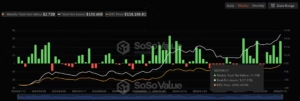U.S. stock markets experienced a significant downturn on Friday, with the Dow Jones Industrial Average closing down by 1.79%. This decline is attributed to the escalating military conflict between Israel and Iran, which has led to increased oil prices and a cautious stance from investors retreating from risk assets.
Late Thursday evening, Israel launched airstrikes targeting Iran’s nuclear and missile facilities, which provoked retaliatory missile launches from Iran during the final hours of Friday’s trading session. As a result, oil prices soared, causing sharp movements in the market.
- The S&P 500 dropped by 1.13%.
- The Nasdaq fell 1.30%.
In the wake of these developments, oil and defense stocks saw gains. Brent crude surged over 7%, briefly hitting a 14% rise during Asian trading hours, while WTI crude approached the $74 mark per barrel. Notable corporations such as ExxonMobil saw an increase of around 2%, with defense contractors like Lockheed Martin and RTX gaining approximately 3% each. Additionally, gold prices edged up 1.4% to reach $3,432 an ounce, closing in on an April record.
This sell-off starkly contrasts with earlier trends of the week, where equities were optimistic. Global markets mirrored the U.S. downtrend, as European and Asian equities recorded losses exceeding 1%. U.S. Treasury yields also experienced a rise, with the 10-year note climbing by 7.9 basis points to reach 4.436%, reversing earlier declines due to safe-haven demand. The dollar rebounded in value, gaining 0.5%.
In response to the rising tensions, President Trump emphasized the need for Iran to return to nuclear negotiations, warning of potential further consequences due to a missed 60-day deadline for discussions. Meanwhile, Iran has withdrawn from planned negotiations with the United States.
On the economic front, the University of Michigan’s consumer sentiment index has shown resilience, rising sharply to 60.5 in June. This outperformed forecasts and indicates a positive consumer outlook despite ongoing geopolitical uncertainties. However, investors are now facing renewed inflation risks stemming from elevated oil prices and the ominous cloud of uncertainty surrounding future actions from the Federal Reserve.
As markets react to continuing developments between Israel and Iran, investor sentiment remains fragile. The volatility suggests a cautious approach will be necessary in the upcoming trading sessions as investors evaluate the impact of geopolitical events on market conditions.







